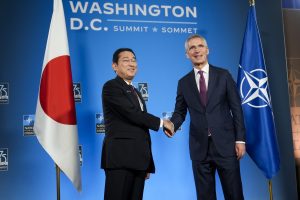As NATO gathered for its 75th anniversary in Washington, on July 11, U.S. President Joe Biden met with the Indo-Pacific Four (IP4) leaders: Japanese Prime Minister Kishida Fumio, President Yoon Suk-yeol of the Republic of Korea, Prime Minister Christopher Luxon of New Zealand, and Deputy Prime Minister and Defense Minister Richard Marles of Australia, to discuss mutual security challenges and how to increase connectivity between Euro-Atlantic and Indo-Pacific nations in the face of Russia’s ongoing aggression in Ukraine.
The leaders of the G-7 and NATO have been united in supporting Ukraine’s defense from the outset of the conflict. Japan, for its part, has provided Ukraine with steadfast support via sanctions, the freezing of Russian central bank assets, and the provision of $12 billion of humanitarian aid and other assistance. In addition, Japan last month became the first non-Atlantic country to sign a key accord in support of Ukraine.
Among Russia’s supporters, the most striking alliance is between Putin and North Korean leader Kim Jong Un. It is likely that North Korea has, since last year, been providing Russia with missiles, such as KN-23, with which to attack Ukraine. Kim welcomed Putin with fanfare in Pyongyang last month and North Korea and Russia quickly entered into a new and comprehensive military cooperation agreement. North Korea has for years been steadily developing its missile capabilities and conducting missile tests near Japan’s EEZ (exclusive economic zone). After consecutive missile launches last month, Kishida instructed the Japanese defense minister to “make every effort to collect and analyze information in close cooperation with the U.S., South Korea and other countries” and remain “vigilant.” To date, however, words, Obama-style strategic patience, or Trump’s summit with Kim, have failed to reverse or temper Kim’s nuclear ambitions.
Tokyo recently issued a statement of “regret” after discovering another Chinese buoy in Japan’s EEZ near the disputed Senkaku islands. China has not moderated its territorial ambitions, and Taiwan watches China’s increasing military surge with concern. The question for Japan, which has territorial disputes with Russia and China (as well as Taiwan and South Korea to a much lesser extent), is what the best course of action might be.
Given Japan is under the U.S. nuclear umbrella, maintaining its alliance with the United States is clearly the best option. North Korea’s missile tests and other provocations are not felt as, or considered, direct existential threats to Japan. In fact, Japan has remained in a weird limbo where many of its citizens are stuck in a uniquely utopian pacifist dogma, preferring that their country not increase defense capabilities while clinging to Article 9. This is a luxury Ukraine does not have.
Russia’s war in Ukraine has taught the world a bitter lesson in that an invasion can happen if a country is not equipped with sufficiently strong (i.e., nuclear) capabilities or protected by a meaningful and convincing collective defense arrangement. Indeed, Kishida took Russia’s action seriously enough to declare to a joint session of the U.S. Congress last year that the “Ukraine of today may be the East Asia of tomorrow.”
Nevertheless, for the first time since World War II, Japan has been shown the bitter fragile reality of its bilateral treaty. Trump openly threatened the “cornerstone” alliance over Japan’s budget contribution while simultaneously praising authoritarian dictators. Even if the security treaty remains, doubt over one party’s commitment is enough to weaken it. Thus, the prospect of a second Trump administration is one that Japan looks to with dismay. A candidate burdened with a record of instability and criminality is a threat. Few democratic nations would choose the uncertainty and chaos of another transactional Trump presidency, but with the U.S. election four months away polls suggest a close race.
Such concerns are the rationale behind the Kishida administration’s energetic courting of nations such as the U.K. and Australia, and Tokyo’s increasingly cooperative approach to NATO. Nothing can substitute Japan’s collective defense capability with the United States, but working with a multilateral bloc such as NATO can only add deterrence into a potential adversary’s calculus.
On July 11, the IP4 nations and NATO’s secretary general announced “flagship projects” to address cyber defense, counter disinformation, and strengthen cooperation. Japan announced personnel exchanges with NATO, classified information sharing, and practical cooperation between Japan’s Self Defense Force (SDF) and NATO. Intelligence collection and sharing, hitherto, has not been Japan’s forte. Tokyo will urgently not only need to build operational and legislative frameworks and capabilities but also adapt and change the mindset and culture of bureaucrats and policymakers.
The world is already, as Biden said, at an inflection point. The U.S. and Chinese have increased their military drills amidst tensions over Taiwan and other territorial disputes in the East and South China Seas, and there are multiple ongoing wars, leadership changes, and major elections. Each presents challenges. It is only natural and rational for Japan to seek to strengthen its cooperation and partnership with NATO whenever it can.

































